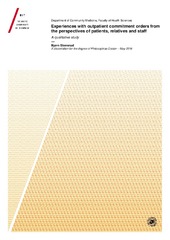Experiences with outpatient commitment orders from the perspectives of patients, relatives and staff - A qualitative study
Permanent link
https://hdl.handle.net/10037/9877View/
Thesis (PDF)
Paper 1: Stensrud, B., Høyer, G., Granerud, A., Landheim, A.S.: “Life on hold: A qualitative study of patient experiences with outpatient commitment in two Norwegian counties”. Also available at Issues in Mental Health Nursing 2015, 36(3):209-216. (PDF)
Paper 2: Stensrud, B., Høyer, G., Granerud, A., Landheim, A.S.: “Responsible, but still not a real treatment partner”: A qualitative study of the experiences of relatives of patients on outpatient commitment orders”. Also available at Issues in Mental Health Nursing 2015, 36(8): 583-591. (PDF)
Paper 3: Stensrud, B., Høyer G., Beston, G., Granerud, A., Landheim, A.S.: “Care or control”. A qualitative study of staff experiences with outpatient commitment”. Also available in Social Psychiatry and Psychiatric Epidemiology 2016, 51(5): 747-755. (PDF)
Date
2016-10-27Type
Doctoral thesisDoktorgradsavhandling
Author
Stensrud, BjørnAbstract
Compulsory outpatient psychiatric care or outpatient commitment (OC) is intended to ensure treatment of people with severe psychotic disorders after discharge from inpatient care. Although OC has long been used in Norway, there is little research-based knowledge of the extent and content of the scheme and a particular lack of knowledge of the experiences of those involved. The studies are based on qualitative interviews with patients subject to OC and their relatives, and focus group interviews with health professionals. The results show that patients found OC to be an obstacle to social integration and prevented them from basing their recovery process on their own experiences. Relatives found that scheme relieved them, but they felt that health professionals did not acknowledge their expertise and experiences. Health professionals experienced a dilemma in attempting to combine therapeutic responsibility with the management of coercion. Recovery from mental illness is largely a question of patients developing everyday coping skills. Health professionals should therefore increasingly consider whether OC is equally useful for all patients with psychosis and whether poor cooperation on treatment may partly be due to patients having other priorities for their lives. Since the use of OC is largely justified by the patient’s treatment needs, the scheme must facilitate patients’ involvement in their own recovery, and use resources in the patient’s environment to enhance treatment. The results show that the interaction between patients, relatives and OC decision makers should be improved compared to how the scheme is practiced today.
Publisher
UiT The Arctic University of NorwayUiT Norges arktiske universitet
Series
ISM skriftserie; 170Metadata
Show full item recordCollections
- Doktorgradsavhandlinger (Helsefak) [770]
- ISM skriftserie [161]
Copyright 2016 The Author(s)
The following license file are associated with this item:


 English
English norsk
norsk
